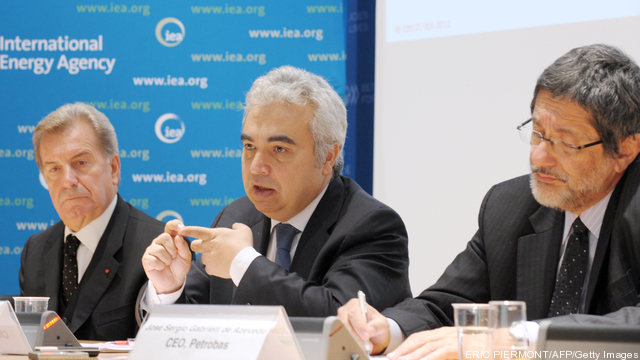Times are changing and Opec is not what it once was in terms of oil price influence, but it’s too soon to completely dismiss the producer group that collectively controls such a large share of the world’s oil production, reserves, exports and thus supply. In this article, a Saudi diplomat argues his country “gets… Keep reading →
International
Energy News Roundup: Opec Increasingly Irrelevant? Cuba Needs New Friends and Egypt Starts Fracking
By Jared AndersonSign up and get Breaking Energy news in your inbox.
We will never sell or share your information without your consent. See our privacy policy.The Russian economy is heavily dependent on oil – prices of which have been falling precipitously – and sanctions imposed by western governments in retaliation for Russia’s aggressive action in Ukraine are putting extreme pressure on the country’s currency. There is concern the Russian government and/or Russian companies lack sufficient currency reserves to pay debt… Keep reading →
Oil prices have fallen, yet negawatts still cheaper than megawatts Oil prices have fallen a bit from their recent highs, yet energy efficiency remains the cheapest option around. That should not come as a surprise, but coming from the conservative, fossil-fuel focused International Energy Agency (IEA) makes it noteworthy. The global energy efficiency market,… Keep reading →
US Clarifies Sanctions Provisions and US Senate Passes a Bill to Codify and Expand Sanctions
By Laura Brank, Darshak Dholakia, Miriam Gonzalez, Hrishikesh Hari, Jeremy Zucker | Dechert LLPAs noted in previous updates, the United States and European Union continue to impose sanctions against Ukrainian and Russian individuals and entities as a result of the turmoil in Ukraine. On 11 December 2014, the US Senate passed the Ukraine Freedom Support Act of 2014 (S. 2828) (hereinafter the “Act”), which would significantly expand the scope of US economic sanctions against Russia if it became law. In addition, the US Treasury Department’s Office of Foreign Assets Control recently released additional guidance regarding the scope of existing US sanctions involving Ukraine and Russia.
Energy News Roundup: Peacebuilding with Israeli Gas, Green Bond Growth and LNG Project Economics Sour Amid Oil Price Drop
By Jared AndersonDeveloping the abundant natural gas resources discovered offshore Israel is a complicated endeavor that involves considerable geopolitical diplomacy in addition to the traditional commercial details that must be worked out when building multi-billion dollar energy projects. “Natural gas is both a geopolitical tool and a target in Israel, where a newfound bonanza of resources has… Keep reading →
Amendments to EU Sanctions against Russia
By Miriam Gonzalez, Jeremy Zucker | Dechert LLPCOP20 in Lima Update: Draft Agreement for Paris 2015 Imminent, but ‘Stakes Not High Enough’
By Roman KilisekUS Secretary of State John Kerry was expected to arrive in Lima (Peru) on Thursday – as previously reported by The New York Times and the BBC – and evidenced by his helicopter already on the ground in Lima Thursday afternoon, according to sources. This exemplifies the importance that “the Obama administration has placed on… Keep reading →
Energy News Roundup: Oil Strongmen Are Weird, Russian Bread Prices Spike and US States Support EV Charging Stations
By Jared AndersonHere’s an interesting look at the peculiar personalities that often accompany top leadership in major oil producing countries like Russia, Iran and Venezuela. “If oil is a factor in the petrostate personality, one might ask whether we might see some change in the leaders, since oil prices have tanked by about 40% in the last… Keep reading →
Building a Global Low-Carbon Technology Pathway
By U.S. Department of EnergyAfter a landmark U.S.-China climate announcement and combined pledges of nearly $10 billion to the Green Climate Fund, there is strong momentum leading into the annual United Nations Framework Convention on Climate Change (UNFCCC) Conference of the Parties (COP 20) in Lima, Peru. At COP 20, climate change negotiators will meet to help build the… Keep reading →
US Presidential Permits For Cross-Border Infrastructure
By Todd Griset | PretiFlahertyAs the U.S.’s international trade in energy grows, so too has interest in the process for securing a federally required approval known as a Presidential Permit.
The construction, operation, and maintenance of infrastructure that crosses the U.S.’s border with Mexico or Canada — think pipelines, transmission lines, and bridges — generally requires prior authorization by the federal government in the form of a Presidential Permit. How you obtain a Presidential Permit depends on the type of facilities in question, as permits may be issued by several federal agencies under different legal authorities.









